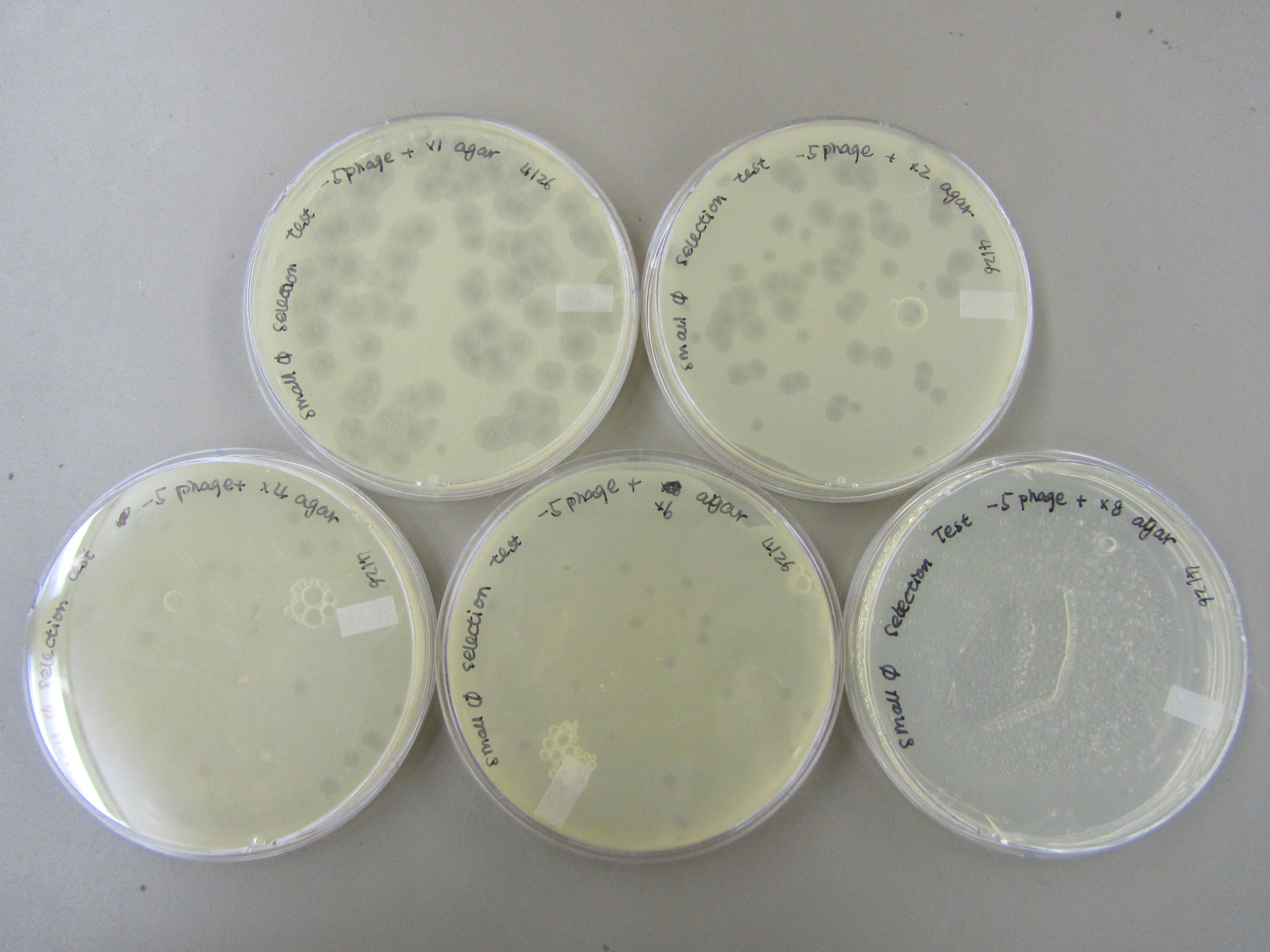|
- Small Phage
- March-April
- May-June
- July-August
- September-October
|
4.26 T7 Phage Selection Test
I) Purpose
- Test the possibility of selecting for smaller phage by increasing agar concentration
II) Expected Outcome
- As top agar increase in concentration, the number of plaques/plate should decrease and individual plaques should become smaller.
III) Reagants Used
- T7 + phage: fresh dilution from 4.8 -4; E coli BL21; Agar: ×2 prepared by Jordan in 500mL glass bottle; LB: prepared by us on 4.3; overnight bacteria culture: set up on Friday at 6:00pm using 4.6 streak; ×8 top agar stock: prepared by us on 4.3
IV) Actual Procedure
1. Made fresh -5 stock phage ×2
- i) 180 μL LB was added to a 1.5mL centrifuge tube. 20 μL of phage stock -4 was then added.
2. Performed selection method test
- i) Six test tubes were labeled control, ×1, ×2, ×4, ×6, and ×8 respectively. To each of the test tubes, 0.5mL of E coli overnight liquid culture was added.
- ii) To ×1, ×2, ×4, ×6, and ×8 test tube 20 μL of -5 phage solution was added. This mixture of E coli and phage was left sitting for 20 minutes before proceeding.
- iii) In a separate set of test tubes, top agar was diluted to give ×1, ×2, ×4, ×6, and ×8 concentration. For specifics, please refer to the chart in the Results section.
- iv) 5mL of top agar was added to each test tube so that the concentration of the agar added matches the labels on test tube. For the control tube, ×1 agar was added. The contents of these test tubes were then plated on LB plates.
- Note: ×6 and ×8 solidified as soon as the content hit the plate. As a result, top agar wasn’t spread evenly.
- v) After the top agar has solidified, the plates were incubated up side down (4.26 6:30pm – 4.27 2:00pm for 19.5hr)
V) Results
1. Plate
Plate results
| Plate
| Content
| Agar
| Results
|
| Control
| 0.5mL E coli
| 2.5 mL ×2 agar + 2.5 mL LB
| Uniform lawn of E coli, with a few pinprick size clearage that might be due to air bubbles. No contamination.
|
| ×1
| 0.5mL E coli + 20 μL of -5 phage
| 2.5 mL ×2 agar + 2.5 mL LB
| Similar results to that seen in 4.25 T7 phage viability test
|
| ×2
| 0.5mL E coli + 20 μL of -5 phage
| 2 mL ×8 agar + 8 mL LB
| Smaller and fewer plaques as compared to ×1
|
| ×4
| 0.5mL E coli + 20 μL of -5 phage
| 4 mL ×8 agar + 4 mL LB
| Smaller and fewer plaques as compared to ×2
|
| ×6
| 0.5mL E coli + 20 μL of -5 phage
| 6 mL ×8 agar + 2 mL LB
| Smaller and fewer plaques as compared to ×4. Seems like the right concentration for selection.
|
| ×8
| 0.5mL E coli + 20 μL of -5 phage
| Stock
| No E coli growth or phage plaque seen. Possibly due to boiling agar killing off everything.
|
2. Selection test result
VI) Conclusion
- The results of this experiment are similar to what we expected. This indicates that our selection method is working. It also seems that ×6 agar is a good place to start our selection
VII) Proposed next step
- Learn the procedures to purifying phage
- Start working on liquid culture to prepare for mutagen treatment.
|
 "
"
